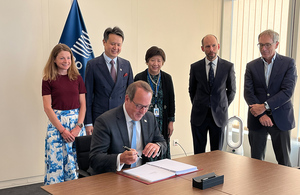UK signs Riyadh Design Law Treaty
The UK has become the latest signatory to the Riyadh Design Law Treaty (RDLT).

Adam Williams IPO CEO, WIPO DG Daren Tang and delegation
On behalf of the UK government, the CEO of the Intellectual Property Office (IPO) has signed this new treaty at the World Intellectual Property Organization (WIPO) General Assembly in Geneva. This new multilateral treaty will bring benefits to UK designers through simplified application and renewal processes and reduced administrative burdens in international applications.
The treaty simplifies and brings harmonisation to the application process for industrial design protection internationally, benefiting UK businesses and designers looking to protect their creations abroad and establish a safe presence internationally.
Adam Williams, the UK IPO’s Chief Executive Officer, signed the treaty today (11 July 2025) witnessed by WIPO Director General Daren Tang during the WIPO General Assembly in Geneva.
Commenting on the signing, Adam Williams said:
On behalf of Minister Feryal Clark, and the UK government, I am pleased to sign the Riyadh Design Law Treaty (RDLT), which will make it easier for designers and businesses, particularly SMEs to apply for, renew or maintain a registered design in other countries.
It will simplify and standardise international design protection, making systems more navigable and will boost UK designers’ ability to safeguard their creations globally.
The signing of this treaty demonstrates the UK’s commitment to supporting designers around the globe and striving for international design law harmonisation and we encourage other nations to do the same.
Following the signing, the IPO will begin engagement with stakeholders and work towards formal ratification of the treaty.
The treaty was negotiated and agreed at the WIPO Diplomatic conference in Riyadh, Saudi Arabia on 22 November 2024.
The provisions of the RDLT will come into force once 15 countries have deposited their instrument of accession with WIPO.
Once in force, the treaty will help simplify processes for businesses, particularly small and medium-sized enterprises (SMEs), enhancing the UK’s competitiveness.
More information
The treaty will simplify the procedures for applying for, renewing or maintaining a registered design, reducing administrative burdens on designers.
It will:
-
limit the information designers will be required to submit in an application form, providing harmonised procedures across all contracting parties
-
simplify the requirements for obtaining a filing date (the date from which protection of the design will start). Speed and ease in getting a filing date are important as delays can lead to the loss of rights (due to the requirement for a design to be “new”)
-
provide harmonised timescales for requests for information and responses in relation to a design registration. This will provide more certainty and predictability for designers
-
encourage modernisation of design systems. This includes use of electronic applications and making public digital databases of registered designs
This transparency will help designers ensure their designs are new and do not replicate existing designs.
Current signatories are:
- Bosnia and Herzegovina,
- Central African Republic,
- Congo,
- Costa Rica,
- Côte d’Ivoire,
- Democratic People’s Republic of Korea,
- Gambia,
- Ghana,
- Lebanon,
- Morocco,
- Paraguay,
- Philippines,
- Republic of Moldova,
- Sao Tome and Principe,
- Saudi Arabia,
- Sudan,
- Uruguay,
- Uzbekistan
- Zimbabwe